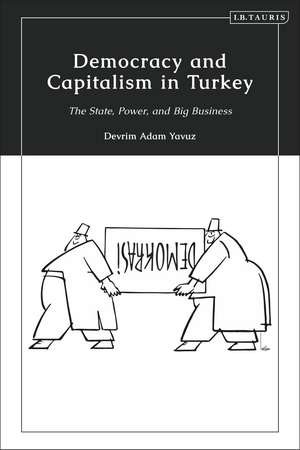Democracy and Capitalism in Turkey: The State, Power, and Big Business
Autor Devrim Adam Yavuzen Limba Engleză Paperback – 21 aug 2024
| Toate formatele și edițiile | Preț | Express |
|---|---|---|
| Paperback (1) | 192.55 lei 3-5 săpt. | |
| Bloomsbury Publishing – 21 aug 2024 | 192.55 lei 3-5 săpt. | |
| Hardback (1) | 511.64 lei 6-8 săpt. | |
| Bloomsbury Publishing – 22 feb 2023 | 511.64 lei 6-8 săpt. |
Preț: 192.55 lei
Preț vechi: 250.01 lei
-23% Nou
Puncte Express: 289
Preț estimativ în valută:
36.84€ • 38.39$ • 30.51£
36.84€ • 38.39$ • 30.51£
Carte disponibilă
Livrare economică 13-27 martie
Preluare comenzi: 021 569.72.76
Specificații
ISBN-13: 9780755649006
ISBN-10: 0755649001
Pagini: 280
Dimensiuni: 156 x 234 x 25 mm
Greutate: 0.4 kg
Editura: Bloomsbury Publishing
Colecția I.B.Tauris
Locul publicării:London, United Kingdom
ISBN-10: 0755649001
Pagini: 280
Dimensiuni: 156 x 234 x 25 mm
Greutate: 0.4 kg
Editura: Bloomsbury Publishing
Colecția I.B.Tauris
Locul publicării:London, United Kingdom
Caracteristici
Provides a useful cross-disciplinary case study relevant to the fields of Middle East studies, Turkish studies as well as political sociology and comparative politics.
Notă biografică
Devrim Adam Yavuz is Assistant Professor at Lehman College of the City University of New York, USA, where he teaches in the areas of political sociology and classical theory. He has published articles in peer-review journals such as Sociology and Government and Opposition.
Cuprins
Introduction 1. Democracy in Turkey2. Capitalism and Democracy; Theorizing the Role of State-Business Relations3. Turkish Capitalists and The State in The World Economy 4. Awakenings: The Making of The Business Elite 1960s to 19805. Prometheus Unbound: Economic Power from 1980 to 20026. The Capitalist Spirit: Sources of Power and Democracy 7. New Authoritarianism, Conflict and the Business Elite's Commitment to DemocracyConclusion References
Recenzii
Does the development of capitalism help or hinder democratization? This is a brilliant contribution to that debate, based on remarkable access to the Turkish business elite, concluding with careful distinctions between state power and the most recent ideological pressures. The book certainly deserves the widest readership.
This book will create a much-needed debate by bringing Turkey's capitalists to the forefront to scrutinize state-business relations. Based on in-depth qualitative interviews, Devrim Yavuz analyzes how the country's wealthiest business elite have played complex leading roles in shaping democratization since 1960s and in navigating through the reversal of democracy in the new millennium. This is a must read for the students and scholars of state-society interaction.
In this fascinating account of state-business relations, Yavuz examines how and why the Turkish business elite became agents of democracy. This insightful and persuasive account moves beyond explanations that consider economic interests as the most critical variable explaining capitalists' actions. Instead, Yavuz directs our attention to the workings of ideological and political power in determining the course and salience of capitalists' push for regime change.
This book will create a much-needed debate by bringing Turkey's capitalists to the forefront to scrutinize state-business relations. Based on in-depth qualitative interviews, Devrim Yavuz analyzes how the country's wealthiest business elite have played complex leading roles in shaping democratization since 1960s and in navigating through the reversal of democracy in the new millennium. This is a must read for the students and scholars of state-society interaction.
In this fascinating account of state-business relations, Yavuz examines how and why the Turkish business elite became agents of democracy. This insightful and persuasive account moves beyond explanations that consider economic interests as the most critical variable explaining capitalists' actions. Instead, Yavuz directs our attention to the workings of ideological and political power in determining the course and salience of capitalists' push for regime change.
